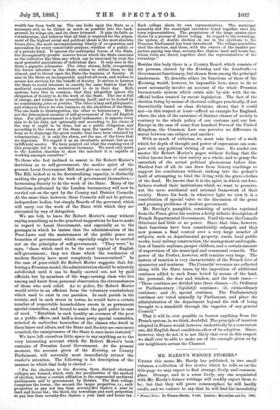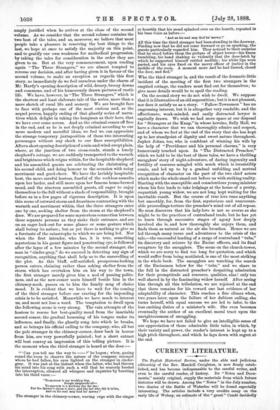MR. HARDY'S WESSEX STORIES.* UNDER this name, Mr. Hardy has
published, in two small volumes, a collection of five stories which he tells us on the title-page we may expect to find strange, lively, and common- place. Strange, and in a sense lively, any one acquainted with Mr. Hardy's former writings will readily expect them to be ; but that they will prove commonplace he will hardly credit, and we venture to say that he will find his incredulity
• Wessex Tates. By Thomas Hardy. 2 vole.' London Macmillan and do. 1238.
amply justified when he arrives at the close of the second volume. As we consider that the second volume contains the two best of the tales, and as, moreover, we believe that most people take a pleasure in reserving the best things to the last, we hope at once to satisfy the majority on this point, and to gratify our own weakness for methodical progression, by taking the tales for consideration in the order they are given to us. But at the very commencement, upon reading again " The Three Strangers," we are almost tempted to reverse our decision, and after having given it in favour of the second volume, to make an exception as regards this first story, so immediately do we feel ourselves under the charm of Mr. Hardy's opening description of wild, dreary, breezy downs and commons, and of his humorously drawn pictures of rustic life. We have, however, in " The Three Strangers," which is the shortest and least elaborate tale of the series, more than a mere sketch of rural life and scenery. We are brought face to face with perhaps one of the most curious and, as the sequel proves, happily ending of that ghastly series of narra- tives which delight in taking the hangman as their hero, that we have ever come across. And as the criminal comes off free in the end, and as he is not deeply criminal according to our more modern and merciful ideas, we feel we can appreciate the strange temporary juxtaposition of these two interesting personages without any shock to our finer susceptibilities.
After a short opening description of a rain-and-wind-sweptplain, where, at the junction of two cross-roads, stands a lonely shepherd's cottage, we are suddenly transported to the warmth and brightness which reigns within, for the hospitable shepherd and his assembled guests are celebrating the christening of his second child, and doing honour to the occasion with noisy merriment and good-cheer. We have the lavishly hospitable host, the more careful hostess, fearful of the reckless assaults upon her larder, and still more upon her famous home-brewed mead, and the nineteen assembled guests, all eager to enjoy themselves to the full without a shade of responsibility, brought before us in a few pages of vigorous description. It is upon this scene of outward storm and dreariness contrasting with the warmth and merriment within, that the three strangers enter one by one, seeking shelter from the storm at the shepherd's door. We are prepared for some mysterious connection between these separate persons as they make their entrance, and are on an eager look-out for some glance or some gesture which shall betray its nature; but as yet there is nothing to give us a foretaste of the catastrophe to which we are being led. Nor when the first intruder, who has, it is true, something mysterious in his gaunt figure and penetrating eye, is followed after the lapse of a few minutes by the second stranger, the man in " cinder-gray," do we succeed in detecting any sign of recognition, anything that shall help us to the unravelling of the plot. As this bluff, self-satisfied, prosperous-looking person enters, claiming rather than asking shelter from the storm which has overtaken him on his way to the town, the first stranger merely gives him a nod of passing polite- ness, and as the new-comer seats himself beside him in the
chimney-nook, passes on to him the family mug of choice mead. It is evident that we have to wait for the coming of the third stranger before our craving for the impending crisis is to be satisfied. Meanwhile we have much to interest us, and must not lose a word. The temptation to dwell upon
the following scene is very strong. The vain attempts of the hostess to rescue her best-quality mead from the insatiable second comer, the gradual loosening of his tongue under its influence, and finally, the ghastly song into which he breaks, and so betrays his official calling to the company, who, all but the pale stranger in the chimney-corner, draw back in horror from him, are very powerfully painted ; but a short extract will best convey an impression of this telling picture. It is the moment when the third stranger is heard at the door :— " Can you tell me the way to — ?' he began ; when, gazing round the room to observe the nature of the company amongst whom he had fallen, his eyes lighted on the stranger in cinder- gray. It was just at the instant when the latter, who had thrown his mind into his song with such a will that he scarcely heeded the interruption, silenced all whispers and inquiries by bursting into his third verse
• To-morrow is my working day, Simple shepherds all- To-morrow is a working day for me: For the farmer's sheer is slain, and the lad who did it teen, And on his soul may God ha' meroy
The stranger in the chimney-corner, waving cups with the singer
so heartily that his mead splashed over on the hearth, repeated in his bass voice as before:-
' And on his soul may God ha' moray !'
All this time the third stranger had been standing in the doorway. Finding now that he did not come forward or go on speaking, the guests particularly regarded him. They noticed to their surprise that he stood before them the picture of abject terror—his knees trembling, his hand shaking so -violently that the door-latch by which he supported himself rattled audibly; his white lips were parted, and his eyes fixed on the merry officer of justice in the middle of the room. A moment more and he had turned, closed the door, and fled."
Who the third stranger is, and the result of the dramatic little incident of the meeting of the first two strangers in the emptied cottage, the readers must find out for themselves ; to give more details would be to spoil the reading.
On the second story we do not wish to dwell. We suppose that it is illustrative of an old superstition; but it is not pleasant, nor does it satisfy us as a story. " Fellow-Townsmen " has no engrossing interest, but it is altogether very readable, and the affectionate, weak-minded, and easily distracted lawyer is capitally drawn. We wish we had more space at our disposal for " Strangers at the %nap," in whose heroine, Sally Hall, we have a character that we can thoroughly admire and respect, and of whom we feel at the end of the story that she has kept up to her standpoint of dignity and sweet nature throughout. Japhet Johns, too, who is confident of winning his wife by the help of " Providence and his personal charms," is very humorously touched upon. In " The Distracted Preacher," which we hold to be the best of these tales, we have a thrilling smugglers' story of night-adventure, of daring ingenuity and fertility of resource mingled with much which is irresistibly comic, and led up to by a gradual unfolding and mutual recognition of character on the part of the two chief actors which make the whole stand out before us with striking reality. Starting with the susceptible and conscientious young minister whom his fate leads to take lodgings at the house of a pretty, coquettish young widow, we are not long kept waiting for the inevitable result. But the course of true love runs anything but smoothly, for, from the first, mysterious and unaccount- able proceedings torture the preacher's mind out of all repose.
He soon discovers that his lady-love is not so averse as she might be to the practices of contraband trade, but he has yet to learn through successive stages of agony how deeply involved she is, and how thoroughly she enjoys them, and finds them as natural as the air she breathes. Hence we are led through many turns and adventures to the crisis of the tale,—the successful landing of a cargo of contraband " tubs," its discovery and seizure by the Excise officers, and its final recapture by the smugglers. The scene on the church-tower, which we are sorry to find too long for quotation, and which would suffer from being mutilated, is one of the most striking in the whole book. The smugglers are watching the search of the Excisemen below for the " tube," and we share to the full in the distracted preacher's despairing admiration for their promptitude and resource, qualities, alas ! only too well shared in by the fascinating widow herself. After seeing him through all this tribulation, we are rejoiced at the end that there remains for his reward one last evidence of her adaptability of character. This reaches a fine climax when, two years later, upon the failure of her dubious calling, she turns herself, with equal success we are led to infer, to the less exciting duties of a minister's wife. She even becomes eventually the author of an excellent moral tract upon the unrighteousness of smuggling.
We hope we have not failed to give an intelligible sense of our appreciation of these admirable little tales, in which, by their variety and power, the reader's interest is kept up to a high pitch throughout, and which he lays down with regret at the end.



































 Previous page
Previous page